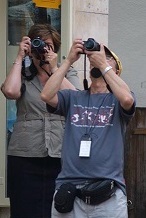
Learn techniques or photographing landscapes, street scapes, wildlife, people and lots more.
Over eight lessons, you will be shown how to achieve a quality record of your trip on film. Your tutor will even advise you on what type of equipment you need and where to buy equipment and film.
A course for anyone planning a special holiday.